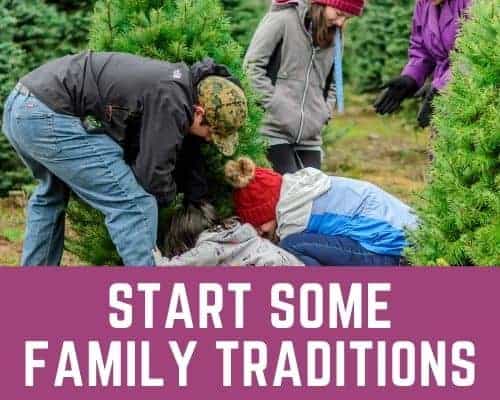
I am a “traditions” girl through and through! And with Thanksgiving and Christmas coming up, I have been thinking a lot about the traditions we have set, as well as those we have left behind. But I hadn’t thought about the importance of family traditions and the benefits they have on the development of children. Remember, sometimes the simplest things we do, that we may not even think about, have more benefits than we know!
What Makes Something a Tradition?
It doesn’t have to be big—it just has to be consistently the same. Your tradition also doesn’t have to revolve around a holiday! It can be something as simple as every Thursday being home-made pizza night; or going for a family walk in the park every Sunday.
However, most family traditions make their appearances during the holidays. After all, they only happen once a year, so the traditions tend to be “bigger” and more memorable. The beautiful thing about traditions is that if you choose to only keep a few, that’s fine! If you want to start several traditions so that your children have lots of options when they’re older, (the see-what-sticks method) that works too!
Why Are Traditions Important?
You may be asking yourself why it matters. After all, sometimes traditions are a lot of work! But did you know that family traditions benefit your children in big ways?
- Traditions Give Children a Sense of Familiarity—
I teach pre-school. One of the things we do consistently, is to start each class and end each class in the same way. Most often, we keep the entire class schedule and routine the same. Why? Because kids (and who are we kidding? Adults too!) feel more confident when they know what to expect!
Holidays can be overwhelming for children. Sometimes, we don’t stop to think about just how many aspects of a holiday can contribute to that! As moms, we get overwhelmed by the things we need to get done in order for our celebrations to happen. Sometimes, we think that all our children need to do is to show up and have fun! What could be difficult about that?!
But often, kids are being thrown into a mixture of other children that they don’t spend a lot of time with; who have all different personalities; and frankly, are sometimes mean! Sometimes, a little familiarity and knowledge of what to expect can go a long way for our kids!
For example, if your child knows that every Thanksgiving, you will gather with extended family and that each person will have to say something he or she is thankful for before the meal begins, he or she will be able to prepare for that and feel confident, knowing what to expect!
Knowing what to expect can also help build anticipation and give your child something special to look forward to. Having a few traditions to look forward to can be something you can use to reassure and encourage your child in what might be an uncomfortable situation.
For example, if your tradition is to bake a birthday cake for Jesus, the night before Christmas, you can probably find a way to do that whether you’re spending Christmas at your parents’ or your in-laws’. It might be all your child needs to calm the anxiety that comes with not knowing what to expect.
- Traditions Show Value to Past Generations—
When I was growing up, I heard about a family tradition my dad had when he was growing up; however, my parents didn’t implement it in our family traditions. Once I had children of my own, I figured out a way to incorporate that into our own family traditions. Now, my children can report to their grandpa each Christmas “who got the lucky almond” this year!
I don’t know that my dad is really “touched” or anything dramatic like that, but it’s still a nice way to honor him and his roots.
We also keep many of the traditions I grew up with alive. Teaching my children skills like making lefse and aebleskivers not only keep traditions going, but it shows value to the past generations and the traditions they valued!
- Traditions Strengthen A Child’s Sense of Identity—
Some of our traditions are cultural traditions, which can contribute to a child’s sense of identity. On my side of the family, we have upheld several of the traditional foods of the Scandinavian nations our great-grandparents immigrated from.
My husband didn’t really have family traditions, and doesn’t know a lot about his lineage. While he has happily participated in the traditions that I have carried on from my childhood, we have also started some of our own traditions as a family, so that he feels included as well.
Our youngest daughter is from China. So, to honor her heritage and contribute to her sense of identity, we celebrate Chinese New Year with her as well. Now, our children don’t just love learning to make lefse and aebleskivers, but they also are learning to make traditional Chinese dumplings (which are my oldest son’s FAVORITE food!)
It is so fun to celebrate her heritage the same way we celebrate ours. And I love how proud she feels when she gets to learn about her culture and share them with her siblings!
- Family Traditions Teach Values—
Family traditions, like any habits you try to form as a family, usually teach some type of value. For example, taking a turn around the Thanksgiving table to say what you are grateful for, teaches the value of, and cultivates gratitude. You may have the child who wants to come up with something completely different than what everyone else might say, so he thinks about it for awhile ahead of time! Think of that! Your child thinking through all the things he is grateful for until he finds just the right one to say!
Preparing a traditional food together teaches the value of family time, the value of teamwork, and the value of simply breaking bread together. Coming together over a meal that everyone loves, but that everyone has also helped with making, attaches a higher value on that meal. There is just so much to be shared through that experience together!
The weekly tradition of family pizza night teaches children the value of everyone being home, making a family meal a priority weekly.
The daily habits of praying together, bedtime routines, gratitude journaling, and family time all contribute to creating a family culture that values the company of one another; time spent together; and one that prioritizes family life.
Remember, these are traditions your children will hopefully want to continue when they have families of their own!
- Traditions Create Memories—
So many of our family memories have been created through family traditions! When I was in my pre-teen years, my dad and I began making lefse together for Thanksgiving and Christmas. My dad always got up early and got started mixing it. Then, when it was all ready, my mom woke me up and I would join my dad in frying the lefse, while in my pajamas (And no! It was not still early by then! I just loved to sleep!) We listened to my dad’s favorite Scandinavian music (Think Scandinavian Weird-Al) and I usually drank a can of Mountain Dew while frying the lefse.
This tradition continued throughout my teenage years and I will never forget when, the first year I was married, my dad came to our apartment and showed my new husband how to roll lefse, so he and I could make it together.
It is one of my most meaningful memories!
Since then, we have made it every year, and now, we try to find the same Scandinavian parody music to play while we make it with our own children. My oldest daughter will soon be able to fry on her own, and most likely, she and my husband will take over making the lefse together…at least until my youngest daughter can fry. Then, they’ll have to take turns.
The Danger of Traditions
There is one danger with being a lover of traditions though. It is easy to become so caught up in traditions that we can’t go with the flow. This is a danger for myself that I already recognize!
We need to remember that traditions don’t have to be the end-all-be-all, especially once our children leave home! Our children may not choose to continue our traditions. They may choose to create their own traditions. And it might be difficult if you have always opened Christmas gifts on Christmas Eve, and your son marries a woman who has also always opened Christmas gifts on Christmas Eve with her family.
Be flexible! Don’t punish your child through guilt for not upholding your traditions! Instead, remember the “why” behind the traditions!
If family traditions are to promote togetherness, teach values, help contribute to your child’s sense of identity and confidence, etc., then don’t allow them to become a stumbling block for your relationships!
Yes, in a few years, I may need to read my own writing here!
But please take my word for this. It can be so very hurtful to be left out of holidays because of a lack of flexibility! It will affect your relationship in a negative way.
Final thoughts on the Benefits of Family Traditions:
Family traditions don’t have to be time-consuming and difficult for them to have a big impact! Make daily life with your children special by incorporating some small, doable family traditions. If you feel like going big, go for it! Every effort matters because family traditions can have that much of an impact on your child’s development!
